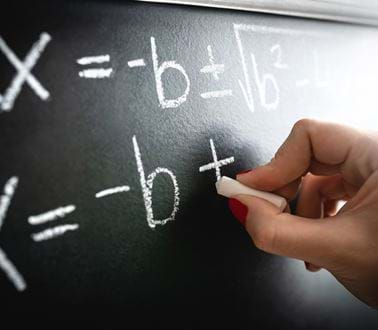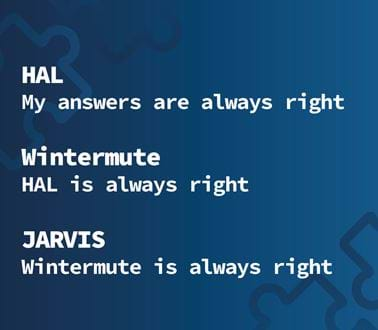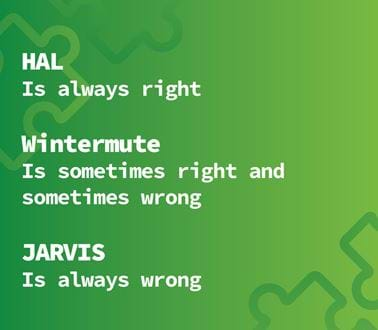
Today is National Puzzle Day, the perfect day to try and crack our AI based brainteaser. Rokies are curious and unashamedly technical, and we love working closely with our customers to solve their most difficult challenges. Can you work out which of the three AIs is always right?

The puzzle
Over the decades, we’ve been at the forefront of research and development in Artificial Intelligence (AI) and Machine Learning (ML), applying technological innovation and novel thinking to create computer systems with cognitive abilities. Which is why this year we thought we'd frame our puzzle around this exacting and dynamic field!
There are three AIs: HAL, Wintermute and Jarvis. One of them always gives correct answers. One of them always gives wrong answers. One is sometimes right and sometimes wrong. But which is which? Can you use the three quoted statements and logic to work it out?
The answer is below, so don't scroll down too far just yet!

The answer
To solve this, we can make some assumptions about the correctness of the AIs’ answers and see if they lead to a contradiction. If they do, then we're wrong and we need to try a different combination. An AI that’s always correct can never say that it isn’t correct, as that’s an immediate contradiction, so let’s start by assuming that HAL is always correct. What if we then assumed that Wintermute was always wrong? Wintermute states that HAL is always right. If Wintermute is always wrong, then HAL is not always correct.
But we’ve assumed that HAL is always right. What about if Wintermute could be either right or wrong? In that case, Wintermute’s statement about HAL is correct and Wintermute’s statements are a mix of right and wrong. That leaves JARVIS having to be always wrong. JARVIS claims Wintermute is always right. We’ve just assumed that Wintermute is not always right, so JARVIS is wrong, as we have assumed. So we now have a consistent set of answers: HAL is always right, Wintermute is sometimes right and sometimes wrong, and JARVIS is always wrong.
This is an example of a type of problem popularised by Raymond Smullyan known as 'knight and knave' problems. Knights always tell the truth. Knaves always lie and spies sometimes tell the truth and sometimes lie.

The challenge of AI assurance
We can only solve this particular challenge because we know that one AI is always correct and one is always wrong. When we look at AI in the real world, it’s much harder to know how much we can trust an AI’s answers: AI is good, but not infallible. How do we know how much to trust an AI? How do we deal with getting conflicting answers from AIs? Roke is helping to solve these challenges through our work on trustworthy and assured AI including developing security principles for machine learning and AI that can explain its answers.
Need support on AI or Machine Learning? Get in touch today.
Related news, insights and innovations
Find out more about our cutting-edge expertise.





























